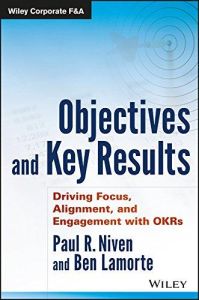Join getAbstract to access the summary!

Join getAbstract to access the summary!
Paul R. Niven and Ben Lamorte
Objectives and Key Results
Driving Focus, Alignment, and Engagement with OKRs (Wiley Corporate F&A)
Wiley, 2016
What's inside?
Dive into the effective implementation and use of objectives and key results (OKRs).
Recommendation
This thorough guide will help you decide whether to use objectives and key results (OKRs), and will teach you to do so effectively. OKR gurus Paul Niven and Ben Lamorte provide details, definitions and examples, as well as the types of objectives, the right number of key results, how to score and grade your progress, when to meet and how often, and even what features to seek in OKR software. More than 200 pages about OKR may seem like a stretch – and there is a bit of extraneous material – but those who must lead an OKR initiative, especially novices, will value this substantive guidance.
Summary
About the Authors
OKR experts Paul Niven and Ben Lamorte consult, train and coach on OKRs worldwide from their base in California.





















Comment on this summary